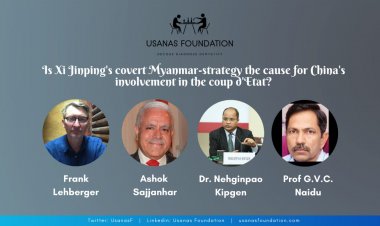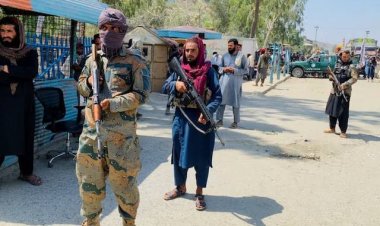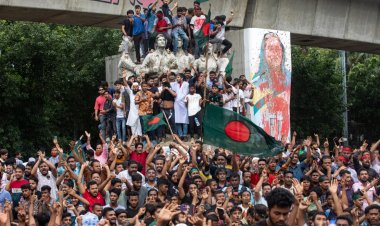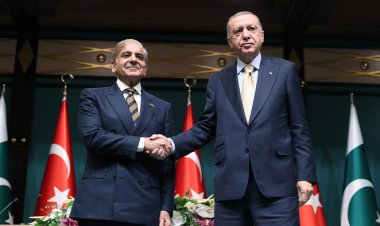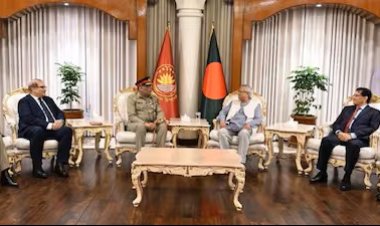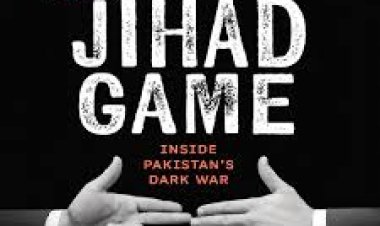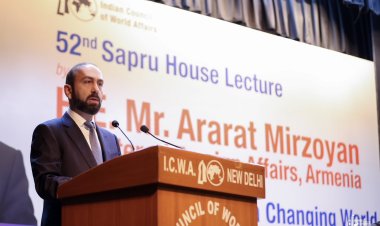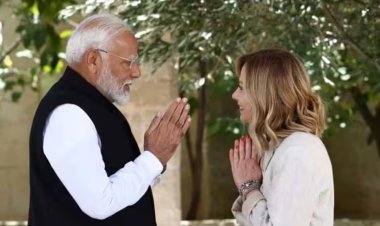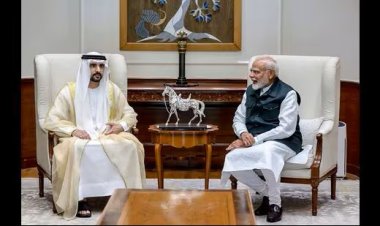China-Pakistan Nexus to Derail Peace Process in Afghanistan
China and Pakistan are consistently trying to have the upper hand in the Afghanistan, post-American withdrawal, by aligning with non-state actors, radical and extremist religious fanatics, like the Taliban. This ferments trouble in Afghanistan and is preventing a broader reconciliation process.
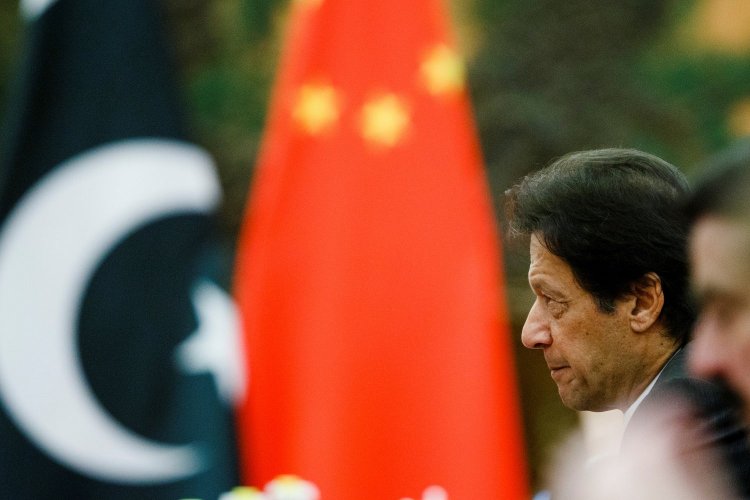
Analysis
By Dr. Nalin Kumar Mohapatra
The recent arrest of 10 Chinese spies for "espionage and running a terror cell" in Afghanistan as reported in Hindustan Times is not a minor issue, and it cannot be brushed aside from the security viewpoint of Afghanistan. The same newspaper report adds that one of the arrested Chinese spy "was in contact with the Pakistan-based terrorist group Haqqani network" which is active in Afghanistan tormenting trouble.
The arrest shows the devious mindset of both Chinese and Pakistani establishments to create instability in Afghanistan, which is beset with fratricidal conflict for the last couple of years. For centuries external powers like Russia and Great Britain in the late 19th Century, the Soviet Union ( Russia ) and the U.S. in the post-1979 and post-2001 intervention fought on the Afghan soil over their geopolitical dominance.
What is intriguing is that China and Pakistan are consistently trying to have the upper hand in the Afghanistan, post-American withdrawal, by aligning with non-state actors, radical and extremist religious fanatics, like the Taliban. It is interesting to note here that apart from Taliban, Pakistan in recent years as reports suggest is also giving shelter to many such insurgent and terrorist groups like the Haqqani Network, ISKP(the Islamic State of Khorasan Province)and many other religious indoctrinate groups who are responsible for bringing political stalemate in Afghanistan.
China's objective appears to instal a puppet regime in Afghanistan, which will ensure its control over the vital mineral resources of Afghanistan and securing the Chinese interest along the BRI(Belt and Road Initiative)corridor. On the other hand, Pakistan is interested in having greater control over Afghanistan to realise its ambitious goal of achieving "strategic depth" which it is pursuing more actively since the mid-1990s.
The arrest of Chinese spies in Afghanistan raised three questions in the context of Afghan security scenario. They are:
- Whether China and Pakistan are trying to oust the elected Ashraf Ghani regime?
- Are the radical and extremist groups trying to sabotage the peace process?
- To what extent China is trying to get the upper hand in Afghan politics by using both Pakistan and its non-state allies the radical and extremist groups?
Some of these questions can be substantiated further to answer pertinent questions discussed above. As reported in Axios, the high officials of the U.S. Administration disclosed that "China offered to pay non-state actors in Afghanistan to attack American soldiers". If this news report is accurate, then it reflects the sinister design of China to create havoc in the trouble-torn Afghanistan. Another point that needs attention here is that this arrest took place when the peace process is underway, and Washington is also expressing its intent to leave Afghanistan. It also needs to emphasise here that as revealed by Afghanistan's Vice President Amrullah Saleh, in his Twitter account "There is an alliance between IS-K & the Taliban at tactical & operational level."
It appears that both Pakistan and China are pursuing a nefarious intent in Afghanistan, which adds volatility to the situation in Afghanistan. The arrests reflect that though there is a Peace Process is operating at the surface, things are more complicated at the ground level. This needs to be taken into account while looking at the Afghan security scenario.
It needs to be mentioned here that China off late started hobnobbing with the Taliban to achieve its own geopolitical and geoeconomics goals in Afghanistan. In this regards China pursued two-fold strategies, i.e., by initiating direct contact with Taliban could have help Beijing to have a better grip over the situation in Afghanistan and at the second level through its client state Pakistan. These twofold strategies of China enunciated, as reports claim, to checkmate the Uighur dissidents who are located in Afghanistan, which China believes is posing a challenge in its "restive" Xinjiang province; at the same time wants to use Afghanistan as a corridor as discussed above to achieve its grandeur geoeconomic objectives.
As has been argued, China started developing a deeper relationship with the Taliban and conducted several rounds of negotiation with them since long as reports suggest. Pakistan is also a part of the process. The "unholy alliance" and sidetrack negotiations are generating suspicious about the intent of China in Afghanistan. What emanates is whether Beijing, through collusion with Islamabad plans to install their proxies in Afghanistan? It has also been reported that China has also allured the Taliban through the promise of large-scale investment in Afghanistan once the U.S withdrew its troops.
This shows slowly China is trying to rope the Taliban into its fold and other terrorist networks which are operating in Afghanistan through collusion with Pakistan to facilitate its grand entry once the U.S. withdrew its army. Secondly, the Chinese authority and Pakistan are not respecting the Afghan people's mandate and their elected government as they are cultivating their networks through these terrorist groups operating in Afghanistan. If the China -Pakistan nexus continues, it will have a dent over the peace process in the longer-run in Afghanistan.
It is a well -known fact that Pakistan is the mother of all the evil forces operating in Afghanistan. The nexus between the Taliban and Pakistan is a known fact in the post-1995 phase, as Pakistan provided all sorts of assistance to Mujahideen and created most terrorist groups operating in the South Asian region. The bonding between the Taliban and Pakistan continued even after the post-2001 era. A leaked NATO report broadcasted in the BBC way back in 2012 reveals a clandestine nexus between them. The report states that "Pakistan's manipulation of the Taliban senior leadership continues unabatedly". The report further adds that "Senior Taliban representatives, such as Nasiruddin Haqqani, maintain residences near ISI headquarters in Islamabad."
Though the Taliban are now on the negotiation table for bringing peace to Afghanistan, Pakistan will use every method to scuttle the peace process. In addition to the Taliban, Pakistan provides all kinds of support to the ISKP, which is slowly expanding its presence in Afghanistan. A recent report titled "Islamic State Wilayat Khorasan: Phoney: Caliphate or Bonafide Province" published in March 2020 brings out the nexus between Pakistan and the ISKP in details. The report adds that "Pakistan is both the chief funder and the primary decision-maker in the actions of ISK. ISK could be employed as a new insurgency to challenge the Taliban if the Taliban's conduct after a peace deal is unsatisfactory. There is at least some logical reasoning behind this." (p.23) The same report further adds that "Pakistan would, therefore, have a fighting force of potentially 20,000 fighters ready to do its bidding in the event of an unsatisfactory deal between the U.S. and the Taliban" (p.23)
The above study is a clear reflection of the fact that Pakistan is trying to create a competitive playing field for both these terrorist organisations( Taliban and ISKP) to expand its sphere of influence. Along with ISKP, it has been observed that some Pakistani-based terrorist groups like "Haqqani Network, Lashkar-e-Taiba, Lashkar-e-Jhangvi, Jaish-e-Mohammad" are operating in Afghanistan.
Thus it is clear that any meaningful solution to the Afghan crisis depends to a greater extent on reigning on these above-mentioned terrorist groups who are operating from Pakistan with impunity and state support and destabilising the Peace Process in Afghanistan. In this regard, it is appropriate to quote William Maley, a renowned scholar in Afghanistan. To quote Maley, "Meaningful peace and security will not come to Afghanistan until the issue of Pakistan's relentless disposition to meddle in Afghanistan's affairs is properly addressed".
Looking at the complex security situation in Afghanistan largely due to the geopolitical motives of both China and Pakistan, how one can address the issue of bringing peace and stability in this war-torn country. In this regard, three propositions are needed to be looked at in detail. They are :
- Given the volatility, there is a need for the presence of peacekeeping troops in Afghanistan.
- A new kind of Peace Process in Afghanistan should be initiated by major external actors like India, the U.S., European Union, Russia, and all neighbouring Central Asian countries.
- Both Pakistan and China should be isolated in future from any international negotiations on Afghanistan for their nefarious role.
- The international community should support the present democratically elected Ashraf Ghani's government
- A special committee should be reconstituted under the United Nations aegis to address the socio-economic problem of Afghanistan.
How does India look at the fragile security situation of Afghanistan? As discussed above, New Delhi should start a new initiative with a comprehensive perspective. In this regard, India's efforts should aim at peacebuilding in Afghanistan through a broader reconciliation process through cooperation with the U.S., E.U., Russia and the Central Asian countries.
To conclude, it can be argued that China and Pakistan are two major external actors who are fermenting trouble in Afghanistan and preventing a broader reconciliation process. Hence, in the future, the major stakeholders of Afghan Peace Process should isolate both–China and Pakistan- for their despicable activities.
Dr Nalin Kumar Mohapatra teaches in the School of International Studies, Jawaharlal Nehru University, New Delhi. He can be reached at nalin238@gmail.com
Disclaimer: This article is the author’s individual scholastic contribution and does not necessarily reflect the organisation’s viewpoint.

